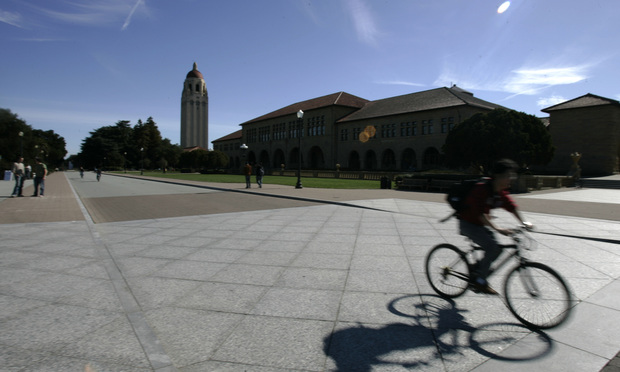2 Stanford Students File Suit Over University Admissions Scandal
Lawyers for Stanford students Erica Olsen and Kalea Woods claim that the value of their education has been tarnished by the scandal. Their lawyers are also pursuing class claims on behalf of applicants who were rejected by schools caught up in the scandal.
March 14, 2019 at 01:53 PM
3 minute read
 Stanford University. Photo: Jason Doiy
Stanford University. Photo: Jason Doiy
Lawyers representing a pair of Stanford University students have filed a proposed class action lawsuit targeting schools currently embroiled in the admissions scandal that has captured the nation's attention.
Lawyers for Stanford students Erica Olsen and Kalea Woods claim that the value of their Stanford education has been tarnished by the scandal.
According to the complaint, filed Wednesday in the Northern District of California by lawyers at The Medler Law Firm and Zimmerman Reed, the degrees the plaintiffs are working toward are “now not worth as much,” since “prospective employers may now question” whether the plaintiffs were admitted on their own merits or if their parents bribed school officials to gain admission.
According to the complaint, Olsen paid about $80 to apply to Yale University and Woods paid $85 to apply to the University of Southern California, where both were rejected. The lawsuit brings claims under California consumer protection laws and common law claims of negligence against schools named in this week's indictment—including Stanford, Yale, USC, the University of California, Los Angeles, the University of San Diego, the University of Texas at Austin, Wake Forest University, Yale University and Georgetown University—on behalf of a proposed class of all applicants who were rejected between 2012 and 2018.
E.J. Miranda, senior director of media relations at Stanford, said the suit is “without merit.”
“We take the issues raised through the events of this week very seriously,” said Miranda in an emailed statement. “While we continue to closely examine our policies and processes to see if improvements should be made, we stand behind the integrity of our admissions process.”
A spokesman for USC said that the school was monitoring the situation. A spokesman for UCLA said the school is aware of the lawsuit, but does not comment on pending litigation.
J.B. Bird, a UT spokesman, suggested the news shocked the Texas university.
“Like many students and families across the country, we are also outraged that parents, outside actors and university employees may have committed fraud surrounding admissions at universities,” Bird said. “The University of Texas has a thorough, holistic admissions process. The actions alleged by federal prosecutors against one UT employee were not in line with that policy and may have been criminal. They do not reflect our admissions process.”
Pamela Gray Payton, a spokesperson for the University of San Diego, said that while the school does not comment on pending litigation it is “commitment to ethical conduct and integrity in our admissions policies and processes is unwavering.”
“The university is conducting an investigation into the allegations,” she said in an email. “If the investigation reveals wrongdoing by individuals associated with the university, we will take appropriate action to address those concerns and to prevent them from recurring.”
The lawsuit also brings civil racketeering claims against William “Rick” Singer, who allegedly used his connections to athletic programs and coaches around the country to secure admissions for underqualified students through his Newport Beach, California-based companies The Edge College & Career Network and the Key Worldwide Foundation.
Read the complaint:
This content has been archived. It is available through our partners, LexisNexis® and Bloomberg Law.
To view this content, please continue to their sites.
Not a Lexis Subscriber?
Subscribe Now
Not a Bloomberg Law Subscriber?
Subscribe Now
NOT FOR REPRINT
© 2025 ALM Global, LLC, All Rights Reserved. Request academic re-use from www.copyright.com. All other uses, submit a request to [email protected]. For more information visit Asset & Logo Licensing.
You Might Like
View All

LSAT Administrator Sues to Block AI Tutor From Using ‘Famous, Distinctive’ Test Prep Materials
3 minute read
Some Elite Universities Favor Wealthy Students in Admissions Decisions, Lawsuit Alleges
5 minute readTrending Stories
Who Got The Work
J. Brugh Lower of Gibbons has entered an appearance for industrial equipment supplier Devco Corporation in a pending trademark infringement lawsuit. The suit, accusing the defendant of selling knock-off Graco products, was filed Dec. 18 in New Jersey District Court by Rivkin Radler on behalf of Graco Inc. and Graco Minnesota. The case, assigned to U.S. District Judge Zahid N. Quraishi, is 3:24-cv-11294, Graco Inc. et al v. Devco Corporation.
Who Got The Work
Rebecca Maller-Stein and Kent A. Yalowitz of Arnold & Porter Kaye Scholer have entered their appearances for Hanaco Venture Capital and its executives, Lior Prosor and David Frankel, in a pending securities lawsuit. The action, filed on Dec. 24 in New York Southern District Court by Zell, Aron & Co. on behalf of Goldeneye Advisors, accuses the defendants of negligently and fraudulently managing the plaintiff's $1 million investment. The case, assigned to U.S. District Judge Vernon S. Broderick, is 1:24-cv-09918, Goldeneye Advisors, LLC v. Hanaco Venture Capital, Ltd. et al.
Who Got The Work
Attorneys from A&O Shearman has stepped in as defense counsel for Toronto-Dominion Bank and other defendants in a pending securities class action. The suit, filed Dec. 11 in New York Southern District Court by Bleichmar Fonti & Auld, accuses the defendants of concealing the bank's 'pervasive' deficiencies in regards to its compliance with the Bank Secrecy Act and the quality of its anti-money laundering controls. The case, assigned to U.S. District Judge Arun Subramanian, is 1:24-cv-09445, Gonzalez v. The Toronto-Dominion Bank et al.
Who Got The Work
Crown Castle International, a Pennsylvania company providing shared communications infrastructure, has turned to Luke D. Wolf of Gordon Rees Scully Mansukhani to fend off a pending breach-of-contract lawsuit. The court action, filed Nov. 25 in Michigan Eastern District Court by Hooper Hathaway PC on behalf of The Town Residences LLC, accuses Crown Castle of failing to transfer approximately $30,000 in utility payments from T-Mobile in breach of a roof-top lease and assignment agreement. The case, assigned to U.S. District Judge Susan K. Declercq, is 2:24-cv-13131, The Town Residences LLC v. T-Mobile US, Inc. et al.
Who Got The Work
Wilfred P. Coronato and Daniel M. Schwartz of McCarter & English have stepped in as defense counsel to Electrolux Home Products Inc. in a pending product liability lawsuit. The court action, filed Nov. 26 in New York Eastern District Court by Poulos Lopiccolo PC and Nagel Rice LLP on behalf of David Stern, alleges that the defendant's refrigerators’ drawers and shelving repeatedly break and fall apart within months after purchase. The case, assigned to U.S. District Judge Joan M. Azrack, is 2:24-cv-08204, Stern v. Electrolux Home Products, Inc.
Featured Firms
Law Offices of Gary Martin Hays & Associates, P.C.
(470) 294-1674
Law Offices of Mark E. Salomone
(857) 444-6468
Smith & Hassler
(713) 739-1250







